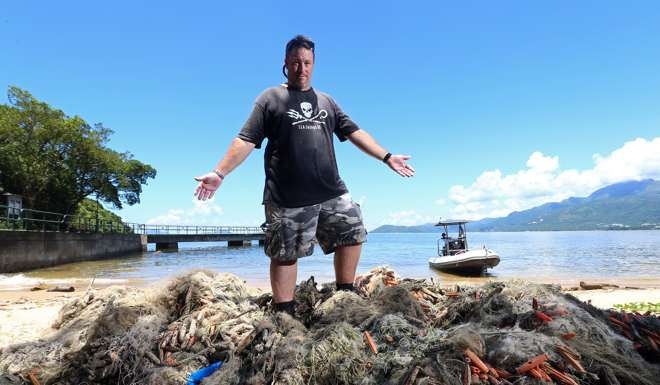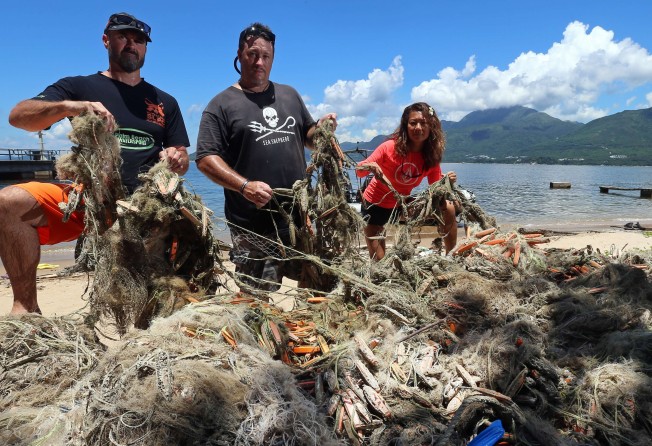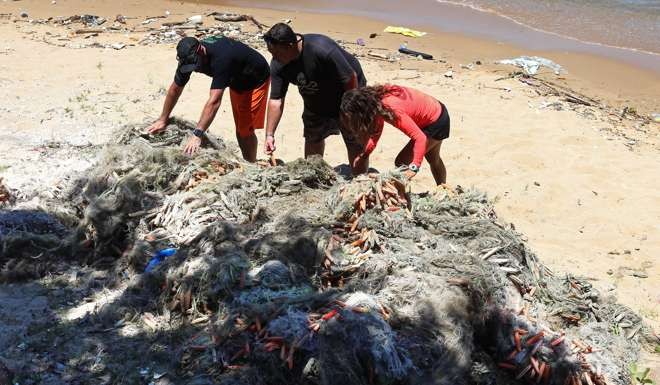
Plague of the ghost nets: how tonnes of dumped fishing debris are threatening Hong Kong marine life
Lantau hunt comes up with nearly four tonnes of dumped fishing nets that pose threat to marine life and humans

Conservationists have raised concerns over the dumping of used fishing nets in waters surrounding Lantau Island, which they say pose a danger to both humans and animals.
Members of Hong Kong water sports teams joined local environmentalists to retrieve between 3.5 and four tonnes of “ghost nets” on a 100-metre stretch of coastline in Pui O last Saturday.
Ghost nets are nets that have been abandoned or lost by fishermen, often after being damaged when they become snagged on rocks.
They are difficult to see in dim light and may simply drift in the sea, becoming tangled into large bundles and trapping various forms of marine life.
Fishermen who dump nets face a fine of between HK$10,000 and HK$50,000, or a 12-month prison sentence.
Gary Stokes, director of marine wildlife conservation group Sea Shepherd Asia, who led the clean-up, is calling for the government to investigate the problem.
He said monofilament nets should be disposed of on land, despite being more difficult to recycle as they are not biodegradable.
“It was shocking, because when we started pulling the nets, they just started coming and coming,” Stokes said.
“It was an eye-opening encounter. Everyone on that beach just thought ‘oh my god, how have we got this much netting?’
“I think if you went to any other part of the coast in Hong Kong, you would find the same amount of nets.
“There were so many dead animals in them – so many lives were wasted. It may be a crab but a crab has got a life, too. It is not an issue of blame, but just asking how they got there.”
Hong Kong is home to more than 5,600 species of marine life, according to a 2014 study, but scientists have warned their ecosystem is at risk of collapsing.
A ban on trawling, introduced in December 2012, was hailed as a potential ecosystem saviour by the World Wildlife Fund, but scientists say it is too early to say whether the improvements will be long-lasting.
Hong Kong’s waters also face high amounts of pollution.
Stokes, who has lived in Hong Kong for 26 years, believes the government has improved in its approach towards the environment, but hopes politicians will make sea life more of a priority.
He said it was encouraging that on the same day as the net operation, Environment Secretary Wong Kam-sing and Development Secretary Paul Chan Mo-po were leading a shoreline clean-up at Shui Hau, where they recovered 127kg of waste.
“Obviously the pollution here is still a major issue that needs to be addressed,” he said.
“We need to talk about a realistic approach. It can be a little bit soul-destroying. I think the government is taking some very positive steps.
“But the mentality here is that once you throw it in the ocean, it is gone. That is the same for everything; it is like ‘problem solved’.”

Stokes said he had nevertheless been encouraged by feedback from locals about the clean-up.
“I have had lots of people asking ‘When are you going out again? I want to come,’” he said.
Environmentalists staged the clean-up after South Lantau resident Iain Brymer found a dead green turtle trapped in a net in January.
He called it Shelly, and the name was given to the event.
Brymer, a 49-year-old director of a logistics company who lives in Pui O, said he has become more concerned by environmental issues, describing Hong Kong as a “fast-paced place with quite a disposable culture where it is always someone else’s problem”.
“Hong Kong has often blamed the mainland for its environment issues but I am not going to be critical of the fishermen. I want to take a collaborative approach,” he said. Brymer enrolled the help of his friends at South Lantau Paddle Club, Lantau Boat Club, Royal Hong Kong Yacht Club, Lamma Outrigger Canoe Club, the Flying Fish, and Hong Kong Outrigger Canoe Club.
Locals also joined the beach clean-up that saw more than 50 plastic bags filled with waste.
Brymer said although they may stage another event this year, educating fishermen may prevent further grief.
“The scale of the nets was quite breathtaking – it took us all by surprise,” he said.
Adrienne Ng, founder of the outdoor activity company Treasure Island, which is based at Pui O, also joined the clean-up.
The abandoned nets pose a danger to humans, particularly small children, she said, adding that a colleague became trapped in one, but thankfully staff were able to cut them free.
“It could be life-threatening. It is completely irresponsible. It is morally wrong to leave them and pollute the ocean.”
A spokeswoman for the Agriculture, Fisheries and Conservation Department said it regularly monitors marine parks and coral.
Its contractor had recovered 176kg of fishing nets at eight coral sites in 2015.
She said the department holds clean-up events to remove ghost nets with the Hong Kong Underwater Association, and added that the government would continue to promote the need to properly dispose of nets.